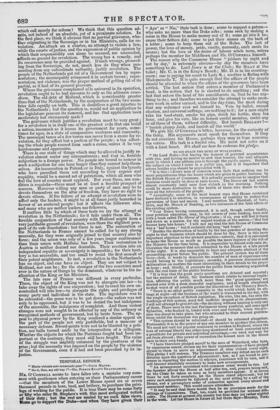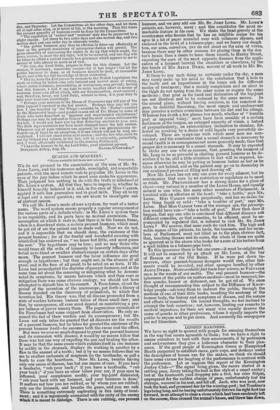fifty who enter St. Stephen's with this most antiquated notion
" It may be said that there would then be no provision made for the or fi of their duty;, but the rest are misled by no such raise views. I clay. The House at present sits usually but four days (or rather nights) llOnte go to -support the Duke—and when they-have given their I in the week. Let theIieuse in future sit but three days—Monday, Tuck! which call merely for reform? We think that this question ad- " Aye" or " No," their task is done ; some to support a patron- mits, not indeed of an absolute, yet of a proximate solution. In who asks no more than the Duke asks ; some seek by making a the first place, we think it obvious that no partial grievance, whe- noise in the House to make money out of it ; some go into it be- ther originating in the Sovereign or in his Ministers, calls for re- cause their fathers did ; some to put their names on the back of volution. An attack on a charter, an attempt to violate a law, a letter ; some to keep them out of the Rules. The lust of while the courts ofjustice, and the expression of public opinion by power, the love of money, pride, vanity, necessity, each sends its which their responsibility can alone be secured, are unassailed, scores ; but the love or the desire of labour sends none, unless affords no ground for revolution. The wrong has a remedy, and perhaps the member for Middlesex and Mr. O'Cozonne himself. its recurrence may be provided against. Ifsuch wrongs, proceed- The reason why the Commons House " jabbers by night and lag from the Sovereign, do not, much less do they when pro- not by day," is extremely obvious—by day the members have ceeding from any subordinate authority, justify revolution. The something to do. Lord JOHN is at the Club ; Sir BILLY at the people of the Netherlands got rid of a Government tax by repre- toilet ; Mr. C. is in the King's Bench ; Mr. D. is in his counting- sentation ; the municipality reimposed it in certain towns ; repre- room ; one is paying his court to Lady S. ; another is flirting with sentation, not violence, was the proper method of getting rid of its Mademoiselle T. It is quite enough that the affairs of the people partial, as it had of its general pressure. should be attended to when the affairs of the governors have been Where the grievance complained of is universal in its operation, settled. The last notion that enters a member of Parliament's revolution ought to be had recourse to only as the ultimum reme- head, is the notion that he is elected to do anything ; and the dium. The old debt of Holland, which is considerably greater last that enters the head of his constituents is, that he has any- than that of the Netherlands, by the conjunction of the two coun- thing to do ; and therefore we consider the attempt to make mem- tries falls equally on both. This is doubtless a great injustice to bers work in sober earnest, and in the day-time, the most daring the Netherlands ; but the question is, would not an application to that any reformer ever set himself to. Vote by ballot, annual the legislature procure its removal, and has that application been election, and universal suffrage, are nothing to it ; for a man might moderately but strenuously made ? take his beef-steak, smoke his pipe, drink his bottle, sleep his The grievance which justifies a revolution must be very great ; hour, and give his vote, like an honest useful member, under any for a revolution is in itself one of the greatest evils that can befall or all three of them, without difficulty. But banish BELLAMY !— a nation, inasmuch as it leaves its government for years, some- " banish plump Jack, and banish all the world." times forages, in a state of comparative weakness and insecurity. We give Mr. O'CoNNELL's letter, however, for the curiosity of The municipal taxes of a few towns can never form a cause for re- the thing. His arguments must speak for themselves. If they volution, for they affect but a portion of the people : a tax affect- do not convince the House, perhaps they may in time convince ing the whole people cannot form such a cause, unless it be very the voters. His task is a fearful one. He must not enter on it volution almost under any circumstances ; and that is, forcible " My Lord Duke—Not having the honour of personal acquaintance subjection to a foreign power. No people are bound to concur in with you, and having no motive to seek that honour, the only adequate such a subjection for one hour e- than they cannot help them- mode in which I can address you is through the public papers. Besides, the subject on which I write is a public one, and it is important that who have parcelled them out according to their caprice and " It is this :—Every man of common sense feels that nothing can be cupidity, would be a sacred act of patriotism, which all men who more preposterous than the hours which are given to public business by feel the love of country must applaud. But even there, one con- the British House of Commons. It is actually monstrous to imagine that dition is requisite—there must be at least a feasible prospect of business could really be done at such hours. The House sat last session success. However willing any man or party of m almost constantly until near four o'clock in the morning. Nothing ' en may be to could be more destructive to the health of those who desire to watch devote others. If the failure of an attempt at revolution were to " Accordingly, some of the most honest men that House contained affect only the leaders, it might be at all times justly hazarded in have declined a re-election, in consequence of inability to endure this favour of an enslaved people : but it affects ihe followers also, perversion of time and season. I may mention Mr. Marshall, of York- and many who are neither leaders nor followers. shire, and Mr. Monck of Reading, as two instances of the fatal effects of the existing system.
was a ' bad house; ' but it certaihly did keep ' bad hours.'
with the real state of the public business.
This pledge I will redeem. The Treasury members may defeat me on each division upon the question of adjournment; but, as I am bound to per- TEMPORAL REFORM. severe in repeating the motion to adjourn, resistance will be vain, and it sittings of Committees. That,. too, could be provided for without diffi-
day, and Thursday. Let the Committees sit the other days, and let them sit at half-after nine, or at latest at ten, in the morning. Thus five times the present quantity of business could be done by the Committees.
"The regulation of 'orders' and motions' may also be preserved by a slight change. Let there be two order days and one motion day, and two motion days and one order day in alternate weeks.
"The public business may thus be effectually done—as effectually at least as the present machinery of misrepresentation will permit. The gross absurdity of consuming the nights in doing that which ought, for every reason, to meet the day-light, will be terminated, and one step will be taken to afford a radical remedy to a grievance which appears to me to savour of folly almost as much as of vice. "Do you, my Lord Duke, prepare in time for this change. Let the session, if necessary, commence sooner—let it last longer—but let the public business be done, as all business should be done, at reasonable hours, and with the full knowledge of those interested. "Having been the first person to propose to the British Legislature the mode of voting by ballot—the only rational and honest mode of voting,
where undue influence, intimidation, or corruption, may prevail ; having had this honour, I feel it my duty to make another effort in favour of common sense—an effort which, with my determination, must succeed ; and, therefore, being, my Lord Duke, warned in time, it is your duty to take your measures accordingly.
"Perhaps your minions in the House of Commons may tell you of the little support I received in the last session. Perhaps they may tell you how I was deserted by the Whigs'—avoided by the Tories'—assailed by the Ministerial band—and goaded in and out of the House by some of those who were described as ignorant and unprincipled adventurers.' Perhaps you may be induced to believe that the next session will resemble the last. I would not have you lay that flattering unction to you'. soul. The Irish representation has been much changed since the last session. Wherever one of your retainers was opposed, he was ignominiously de- feated—or, if there be an exception, it is one which will not be long un- explained. I will not stand alone next session ; and the few who stood by me for Ireland and reform, in the last, will be considerably, powerfully, and, I trust, effectually reinforced in the ensuing Parliament. "I have the honour to be, my Lord Duke, your obedient servant,



























 Previous page
Previous page